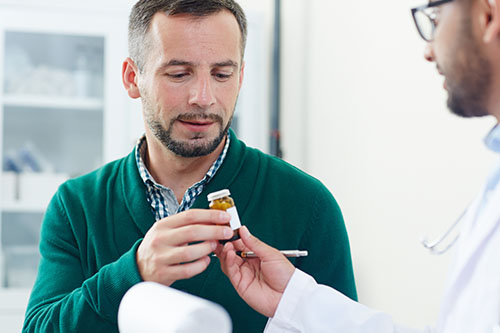The opioid epidemic has impacted every corner of the United States, and its devastating effects are felt by communities large and small. Medication-assisted treatment, also known as MAT, is a type of treatment for addiction that involves using medication along with counseling and behavioral therapy.
MAT programs have been proven to be an effective way to address opioid addiction, and MD M.A.T.T. Baltimore is committed to making these life-saving services more accessible than ever. Contact us today at 410.469.6561 to learn more about how we can help you or a loved one recover.

What Is Medication-Assisted Treatment?
MAT programs work by using medications to reduce cravings and withdrawal symptoms while also providing counseling and other forms of support to help patients recover from addiction.
We provide Suboxone treatment as part of our MAT program.
There are several different medications that can be used in MAT. The three most common are methadone, buprenorphine, and naltrexone. Each of these medications works in different ways to help those struggling with addiction manage their cravings and withdrawal symptoms.
At MD M.A.T.T., we’ve found that Suboxone, a combination of buprenorphine and naloxone, is an effective medication for our patients. Suboxone helps to reduce cravings and withdrawal symptoms while also blocking the effects of other opioids.
Benefits of Medication-Assisted Treatment
Reducing Cravings
One of the biggest triggers for relapse is intense cravings for opioids. Medication-assisted treatment can help to reduce these cravings, making it easier for those in recovery to stay on track.
Cravings happen because of the changes that addiction has made to the brain. When someone is addicted to opioids, their brain chemistry is altered. This change can make it difficult to feel happy or content without the drug. Medication-assisted treatment helps to restore the brain’s chemistry, which can, in turn, help reduce cravings.
Withdrawal Symptom Relief
Quitting opioids cold turkey can be difficult and often leads to relapse. This is because quitting suddenly can cause withdrawal symptoms like:
- Nausea
- Vomiting
- Diarrhea
- Muscle aches
- Fatigue
Medication-assisted treatment can help to relieve these symptoms, making it easier for those in recovery to stick to their treatment plan. Withdrawal symptom relief can significantly affect someone’s ability to stay sober in the early stages of recovery.
Improved Mood and Sleep
Opioid addiction can take a toll on your mental and physical health. Medication-assisted treatment can help to improve your mood and sleep, two critical factors in overall health.
The rush of dopamine that comes with using opioids can lead to feelings of euphoria. However, once the effects of the drug wear off, you may experience a crash that leaves you tired, irritable, and depressed. Medication-assisted treatment can help to even out these mood swings, making it easier to cope with everyday stressors.
In addition, opioid addiction can cause sleep problems like insomnia. This can make it difficult to focus and make good decisions. Medication-assisted treatment can help to improve your sleep, which can, in turn, improve your overall health.
Improved Ability to Focus on Treatment
Finally, medication-assisted treatment can help to improve your ability to focus on your treatment. When you’re struggling with addiction, it can be difficult to stick to your treatment plan. Medication-assisted treatment can help to improve your focus and motivation, making it easier to stay on track.
Start Your MAT Journey at MD M.A.T.T. Baltimore
MAT programs are an evidence-based approach to treating opioid addiction, and they are more effective than other treatment methods like detoxification or behavioral therapy alone. Contact us today at 410.469.6561 to get started. We offer same-day appointments so you can begin your healing journey immediately. Purpose, progress, and community are waiting for you.


